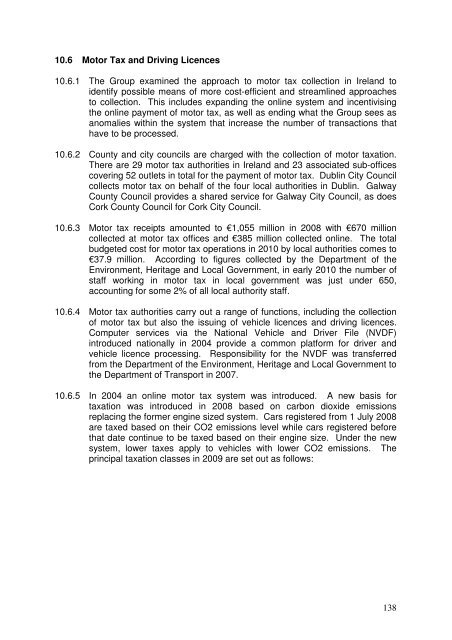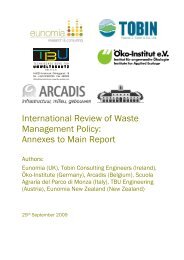Report of the Local Government Efficiency Review Group
Report of the Local Government Efficiency Review Group
Report of the Local Government Efficiency Review Group
Create successful ePaper yourself
Turn your PDF publications into a flip-book with our unique Google optimized e-Paper software.
10.6 Motor Tax and Driving Licences<br />
10.6.1 The <strong>Group</strong> examined <strong>the</strong> approach to motor tax collection in Ireland to<br />
identify possible means <strong>of</strong> more cost-efficient and streamlined approaches<br />
to collection. This includes expanding <strong>the</strong> online system and incentivising<br />
<strong>the</strong> online payment <strong>of</strong> motor tax, as well as ending what <strong>the</strong> <strong>Group</strong> sees as<br />
anomalies within <strong>the</strong> system that increase <strong>the</strong> number <strong>of</strong> transactions that<br />
have to be processed.<br />
10.6.2 County and city councils are charged with <strong>the</strong> collection <strong>of</strong> motor taxation.<br />
There are 29 motor tax authorities in Ireland and 23 associated sub-<strong>of</strong>fices<br />
covering 52 outlets in total for <strong>the</strong> payment <strong>of</strong> motor tax. Dublin City Council<br />
collects motor tax on behalf <strong>of</strong> <strong>the</strong> four local authorities in Dublin. Galway<br />
County Council provides a shared service for Galway City Council, as does<br />
Cork County Council for Cork City Council.<br />
10.6.3 Motor tax receipts amounted to €1,055 million in 2008 with €670 million<br />
collected at motor tax <strong>of</strong>fices and €385 million collected online. The total<br />
budgeted cost for motor tax operations in 2010 by local authorities comes to<br />
€37.9 million. According to figures collected by <strong>the</strong> Department <strong>of</strong> <strong>the</strong><br />
Environment, Heritage and <strong>Local</strong> <strong>Government</strong>, in early 2010 <strong>the</strong> number <strong>of</strong><br />
staff working in motor tax in local government was just under 650,<br />
accounting for some 2% <strong>of</strong> all local authority staff.<br />
10.6.4 Motor tax authorities carry out a range <strong>of</strong> functions, including <strong>the</strong> collection<br />
<strong>of</strong> motor tax but also <strong>the</strong> issuing <strong>of</strong> vehicle licences and driving licences.<br />
Computer services via <strong>the</strong> National Vehicle and Driver File (NVDF)<br />
introduced nationally in 2004 provide a common platform for driver and<br />
vehicle licence processing. Responsibility for <strong>the</strong> NVDF was transferred<br />
from <strong>the</strong> Department <strong>of</strong> <strong>the</strong> Environment, Heritage and <strong>Local</strong> <strong>Government</strong> to<br />
<strong>the</strong> Department <strong>of</strong> Transport in 2007.<br />
10.6.5 In 2004 an online motor tax system was introduced. A new basis for<br />
taxation was introduced in 2008 based on carbon dioxide emissions<br />
replacing <strong>the</strong> former engine sized system. Cars registered from 1 July 2008<br />
are taxed based on <strong>the</strong>ir CO2 emissions level while cars registered before<br />
that date continue to be taxed based on <strong>the</strong>ir engine size. Under <strong>the</strong> new<br />
system, lower taxes apply to vehicles with lower CO2 emissions. The<br />
principal taxation classes in 2009 are set out as follows:<br />
138
















